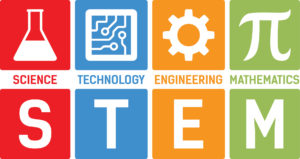[cmsmasters_row][cmsmasters_column data_width=”1/1″][cmsmasters_text]
Science Technology Engineering & Mathematics (STEM) in Christian Schools
STEM has quickly become a hot topic of discussion in households and education circles throughout the world. STEM is short for science, technology, engineering and math. Some insist the STEM subjects are the “real” subjects while the soft sciences are comparably less challenging. One thing is for certain: the jobs of the future will primarily be in STEM fields.
Why STEM is so Important for Private School Students

Research shows students exposed to STEM courses develop critical thinking skills as well as their creativity faster than those who lack early exposure to the hard sciences. Perhaps just as important is the fact that STEM subjects help students solve problems and make prudent decisions in a timely manner. Even if you are not overly concerned about your son or daughter’s ability to think in a critical manner and solve problems, you are likely concerned about employment opportunities after graduation.
STEM students typically receive more and higher-paying job offers than those who specialize in the soft sciences such as sociology, anthropology, English, etc. This phenomenon is the result of our society-wide transition toward technology. The vast majority of “living wage” jobs that will be available upon graduation are in STEM fields. The moral of this story is if your offspring is not exposed to STEM subjects, he or she will lack the knowledge and skills necessary to prove competitive in the job market.
STEM in the Context of Faith-based Education
The best Christian schools have plenty of resources available to teach STEM courses in addition to providing instruction pertaining to faith and the soft sciences. However, these subjects are not mutually exclusive of one another. Rather, the truly elite Christian schools provide an interdisciplinary approach to teaching and learning that emphasizes how STEM subjects overlap with the soft sciences, faith, and other important material. Even the basic instruction of math and science during the early years of education establishes an important STEM foundation to build upon with more challenging and detailed courses in the hard sciences as time progresses.
The pressing question asked by most parents and students interested in faith-based learning is what is the vision for STEM courses in the context of Christian education? Our vision for STEM in Christian schools is centered on the manner in which instruction is provided. Lessons must be carefully crafted to help students gain an appreciation for God’s created order while learning practical math, science, and engineering skills that help solve important challenges.
Contrary to what many insist, the teachings of the Bible do not contradict the findings of science. God created nature and science is the study of nature. God created the physics of our tangible world so it is only right that we study physics, math, and science in order to maximize our quality of life. It is best to think of the mathematical truths of this physical plane of existence as representative of God’s unparalleled precision. Enroll your son or daughter at a Christian school that provides STEM instruction and you will help him or her develop an in-depth understanding of how the creator God designed our amazing world.
Early Exposure to STEM Helps Students Find Their Purpose
The days of studying liberal arts or business are quickly fading away in favor of STEM subjects. Ask hiring managers about the most in-demand skills and you will quickly find the world has more than enough liberal artists and business professionals. In short, our society is short on people who make meaningful contributions and serve a powerful purpose. To put it simply: we need more STEM superstars!
Provide your child with the opportunity to study STEM along with faith-based instruction and you will have done your part to cultivate his or her sense of wonder, imagination, and curiosity. This is your child’s opportunity to analyze God’s world to truly understand how it works, discern the higher power’s intent for this plane of existence and ultimately serve his or her fellow man in a practical manner.
[/cmsmasters_text][/cmsmasters_column][/cmsmasters_row]








